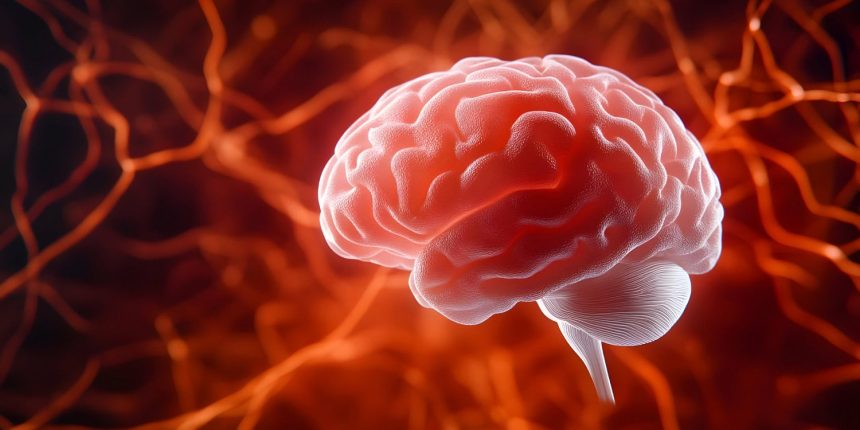A recent study published in The Journal of Clinical Endocrinology & Metabolism has shown that adhering to a ketogenic diet can lead to significant increases in both cerebral blood flow and levels of a crucial brain protein in cognitively healthy adults. This research indicates that such a dietary approach, widely recognized for its weight loss and epilepsy management benefits, may also enhance cognitive functions in those without cognitive impairments.
Typically, the brain primarily utilizes glucose for its energy needs. However, when carbohydrate consumption is drastically reduced, the body enters a state of ketosis. During this metabolic phase, the liver transforms fats into ketone bodies—namely β-hydroxybutyrate, acetoacetate, and acetone—that can cross the blood-brain barrier to be used as an alternative energy source.
A ketogenic diet is structured to simulate the effects of fasting by significantly lowering carbohydrate intake while raising fat consumption, usually comprising about 70–75% of calories from fat, 20% from protein, and merely 5–10% from carbohydrates. The aim is to shift metabolism towards fat oxidation and ketone production.
The motivation for the study stemmed from new evidence suggesting that ketone bodies may not only serve as a backup energy supply for the brain but could also provide direct benefits to brain health. Past studies have indicated that individuals suffering from mild cognitive impairment and Alzheimer’s disease often struggle to efficiently utilize glucose in the brain. Since ketones can bypass some of the disrupted pathways in these conditions, they may help balance energy levels effectively.
Beyond energizing the brain, ketone bodies potentially influence various brain signaling pathways, inflammation, and the generation of neurotrophic proteins such as brain-derived neurotrophic factor (BDNF), vital for neuron survival and synaptic function. Researchers sought to determine if these advantages would extend to cognitively healthy individuals.
To explore this, the study involved a controlled trial with 11 cognitively healthy adults between the ages of 50 and 70, all classified as overweight. Each participant underwent two distinct three-week dietary periods in a crossover design, where they experienced both a ketogenic and a standard diet, separated by a one-week interval. The sequence of the diets was randomized.
During the ketogenic phase, participants were instructed to follow a high-fat, low-carbohydrate diet designed to induce ketone body production—comprising around 75% fat, 20% protein, and only 5% carbohydrates. Participants tracked their blood ketone levels, using a flash monitoring device, and those who failed to achieve a designated ketone level in the first week were excluded. In the standard diet phase, participants adhered to the Nordic Nutrition Recommendations, which advocate a conventional balance of macronutrients.
The impacts of each diet were evaluated using sophisticated brain imaging techniques. At the conclusion of each dietary phase, participants received a brain scan with positron emission tomography (PET) to measure cerebral blood flow in various brain regions, complemented by magnetic resonance imaging (MRI) scans to help interpret the PET data. Blood samples were also obtained on the same day to quantify the ketone molecule β-hydroxybutyrate and BDNF levels.
The study’s results showed a notable elevation in both ketone levels and brain-related outcomes during the ketogenic diet. After three weeks on this diet, participants exhibited a more than twelvefold increase in blood levels of β-hydroxybutyrate compared to the standard diet, confirming their state of nutritional ketosis. Cerebral blood flow was found to be an average of 22% higher during the ketogenic phase, with this increase detected across multiple brain regions through precise PET imaging.
The rise in blood flow was accompanied by a 47% increase in BDNF levels during the ketogenic phase. BDNF, often referred to as the “fertilizer” of the brain, is crucial for the growth, maintenance, and survival of neurons. Low BDNF levels have been associated with neurodegenerative diseases, including Alzheimer’s. Prior research indicated that short-term use of ketone supplements could elevate BDNF levels, but this study showcased that sustained nutritional ketosis can also bolster BDNF over time.
Additionally, the research uncovered a strong correlation between blood ketone concentrations and cerebral blood flow across the two dietary phases, suggesting that elevated ketone levels might be directly linked to increased brain perfusion. This finding reinforces the hypothesis that ketone metabolism could enhance cognitive function, even in individuals without cognitive decline.
Although the study involved a small group—only 11 participants completed the study—the consistency of the results across subjects, along with rigorous imaging and biochemical evaluations, provides a robust foundation. Notably, no serious side effects were reported, and all participants successfully achieved and sustained a ketotic state during the ketogenic phase.
This research further builds on earlier findings in populations with mild cognitive impairment or Alzheimer’s disease, where ketogenic diets or ketone supplements have been correlated with improvements in brain energy metabolism. However, it was previously uncertain if these benefits would also apply to individuals exhibiting no cognitive decline. This study addresses that gap, demonstrating that a ketogenic diet can enhance both blood flow and neurotrophic support in cognitively healthy adults.
Low cerebral blood flow has been linked to potential cognitive decline in both patients with cognitive issues and healthy subjects. Several studies suggest that lower blood flow in specific brain areas correlates with increased memory problems and diminished executive function over time. By promoting cerebral perfusion, a ketogenic diet may offer protective benefits against cognitive decline, although further research is necessary to substantiate this assertion.
The researchers also emphasized the significance of BDNF concerning brain aging. BDNF regulates synaptic plasticity—the brain’s ability to adapt and reorganize, crucial for learning and memory. Reduced BDNF levels are commonly found in moderate to severe Alzheimer’s cases. Thus, increasing BDNF through dietary measures or similar interventions could bolster neural resilience and potentially delay cognitive symptoms.
Despite the promising findings, the study’s limitations include its small participant pool. Larger sample sizes will be required to validate the wider applicability of the results. Additionally, the subjects were all overweight, which might limit the findings’ relevance to individuals of normal weight or those with differing metabolic profiles. The intervention lasted only three weeks; it’s still unknown whether these effects would remain or amplify with prolonged adherence to a ketogenic diet.
Future research could investigate whether similar enhancements in cerebral blood flow and BDNF levels occur in varying populations, including those at risk for dementia, individuals with metabolic syndrome, or younger adults. Additionally, examining how different types of ketogenic diets impact brain health could yield important insights into nutritional sources and their effects on cognition.
The study, titled “A 3-Week Ketogenic Diet Increases Global Cerebral Blood Flow and Brain-Derived Neurotrophic Factor,” was authored by Thien Vinh Luong, Kim Vang Hansen, Allan Kjeldsen Hansen, Stephen C. Cunnane, Niels Møller, Esben Søndergaard, Lars Christian Gormsen, and Mads Svart.










